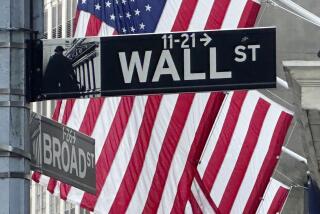Bond Prices Tumble as Dollar’s Fall Raises Fear of High Inflation
- Share via
NEW YORK — Bond prices plunged again Monday, accelerating the market’s downturn over worries that a weakening dollar and spreading trade protectionism could rekindle high inflation.
The stock market also reacted to a possible trade war with Japan and the dollar’s steep descent. The Dow Jones average of 30 industrials fell 57.39 to 2278.41, its third-worst daily drop ever.
The bellwether 30-year Treasury bond, off nearly 1 point Friday, fell more than 2 points, or $20 per $1,000 in face value. The yield soared to 7.83% from 7.65% Friday.
“Right now, I’d say we don’t have a panic, we have an orderly decline,” said Robert Brusca, chief economist for Nikko Securities Co. “But we’re still in a very confusing and dangerous market environment.”
A key factor in that environment was the continued drop of the dollar in foreign exchange, especially against the Japanese yen. Despite reported heavy dollar buying by the Bank of Japan, the dollar finished at record lows against the yen in Tokyo and New York and also fell against other major currencies.
The weak dollar--which makes imports more expensive--is seen as potentially rekindling high inflation, an enemy of bond prices.
At the same time, the Federal Reserve may be forced to push interest rates higher to help bolster the dollar and dampen inflationary trends, said William Gross, head of fixed-income investment at Pacific Investment Management Inc. in Newport Beach.
Bond prices move in the opposite direction from interest rates.
Analysts said traders also were reacting to the Reagan Administration’s announcement Friday that it might impose penalty tariffs on a variety of Japanese electronics goods to retaliate for what the United States perceives as Japan’s failure to live up to a semiconductor trade agreement.
“Protectionism simply breeds inflation; there’s nothing else to it,” said Brusca. “It forces import prices higher, and that will feed inflation.”
Separately, the Treasury Department sold $6.4 billion in three-month bills at an average discount rate of 5.72%, up from 5.55% last week. Another $6.4 billion in six-month bills was sold at an average discount rate of 5.80%, up from 5.55% last week.
The rates were the highest since July 28, when three-month bills sold for 5.86% and six-month bills averaged 5.89%.
In the secondary market for Treasury bonds, prices of short-term government securities fell in the range of 7/32 point to 3/8 point; intermediate government securities ranged from 1/2 point to 15/16 point lower, and 20-year issues dropped about 2 points, according to Telerate Systems Inc.
The movement of a point is equivalent to a change of $10 in the price of a $1,000 bond.
In corporate trading, industrials were down 1 point and utilities fell 3/4 point in slow trading, Salomon Bros. said.
Among tax-exempt municipal bonds, general obligations were down 1 1/2 points and revenue bonds fell 1/2 point, Salomon Bros. said. Trading was moderate.
Yields on three-month Treasury bills rose 3 basis points to 5.66%; six-month bills were up 8 basis points to 5.75%, and one-year bills rose 6 basis points to 5.84%, according to Salomon Bros. A basis point is one hundredth of a percentage point.
The federal funds rate, the interest on overnight loans between banks, was quoted at 6.25%, up from 6.125% Friday.
Main story, Part 1, Page 1.
More to Read
Inside the business of entertainment
The Wide Shot brings you news, analysis and insights on everything from streaming wars to production — and what it all means for the future.
You may occasionally receive promotional content from the Los Angeles Times.










